What to eat before working out at the gym?

Imagine this – you’re getting ready to hit the gym, your bag is packed, you’ve got your water bottle and you’ve put on your headphones to start getting in the zone. And then suddenly, you feel it – a rumble in the gut and an empty feeling. You’re hungry. And hungry is not a great state to be in if you’re trying to get the most out of your workout. So, how can you deal with that?
One of the best things you can do is to optimize your nutrition before working out. That accounts for the meal you can have before going to the gym and/or also a snack if you need it. In this post, we’ll help you understand how to make food choices that can nourish you and your workout.
Can You Burn Fat And Build Muscle at the Same Time?
Body recomposition, or the act of burning fat and building muscle at the same time, sounds ideal. After all, converting fat into muscle mass will not only make you feel better but also make you look toned and lean. But is it actually feasible?
Yes! The practice comes from bodybuilders, who have developed techniques to do that. You can combine the proper training and eating methods to lose weight and gain muscle.
And the good news doesn’t stop there. It appears to be possible for those starting out and those who are already actively training. Therefore, no matter where you are in your fitness journey, you can achieve the body goal of your dreams.
Benefits Of Losing Fat And Gaining Muscle
Why might you want to learn how to gain muscle and lose weight?
One of the obvious reasons that you may think of is your appearance. Improving your body composition can undoubtedly help you get closer to your ideal. After all, it's good to continuously work on yourself.
However, that's not the only reason you may want to lose weight and gain muscle. There are also many health benefits associated with this change.
Gaining muscle can be beneficial in the following ways:
- It can increase your lean body mass. This affects many parameters of your day-to-day life. For example, it can increase the amount of calories you burn daily.
- Building muscle can increase bone strength, which can lower the risk of bone injury.
- It can help you age better. Increased muscle is beneficial when we age, as we naturally lose some muscle with age. In addition, it can help lower the risks of injury.
Losing weight can also be beneficial for you as:
- It can help you improve your cardiovascular health. Weight loss can help lower blood pressure and "bad" cholesterol levels.
- It can help you sleep better. Some people with excess weight may find themselves struggling to sleep due to sleep apnea. This can be improved with weight loss.
- It can improve your overall quality of life.
- It can support your mental health.
- It may benefit your fertility and improve your sexual life.
- It can improve your life span and lower the risks of many diseases.
There are obviously many benefits to both losing weight and building muscle. Now, let's dig into the real question—how to gain muscle and lose weight.
Workouts for Losing Fat and Gaining Muscle
Both muscle gain and weight loss require exercise. Exercise is obviously essential for you. It helps keep us healthy in general. However, it's necessary for those who want to lose fat and gain muscle.
Strength training is key to building muscle and is also beneficial for weight loss. Resistance training provides our muscles with the stimulus to grow. Our muscles need to be challenged to kickstart their synthesis. Learn more about the science of this process in our "How Muscle Works" post.
Resistance training also helps prevent muscle loss in a calorie deficit. One issue with losing weight is that you risk muscle loss due to insufficient calorie intake. Strength training can be a great strategy to mitigate this.
Start off with training three times a week, ensuring that you’re targeting your whole body equally. For those who are more experienced with strength training, more days or a more intense workout plan may be beneficial. Remember to increase weight gradually – if you’re finding your workouts too easy, you’re not using a heavy enough weight.
Cardio is an important part of losing weight and gaining muscle, too. Many people think that cardio exercises help lose weight but not gain muscle. However, that's not true. Cardio can help you build muscle, but it may be slower.
It's essential to add some cardio to your routine. It can help you burn extra calories to assist weight loss efforts. High-intensity interval training (HIIT) can be a great way to get your blood pumping and help you with weight loss. A 2023 review suggests that it can improve fat-free mass and lower body fat percentage.
Finally, don't forget to add mobility and flexibility to your routine. These types of workouts may not contribute to muscle-building or weight loss, but they can be great for recovery and increase your range of motion. This can help you with better technique in your lifts, ensuring you're lowering your risk of injury.
Here are some tips for getting the most out of your workouts:
- Make them fun. This may mean you need to occasionally switch things up with a new set of exercises.
- Properly warm up and cool down can help lower your risk of injury. Before your training, it's a good idea to include passive and dynamic stretches.
- Do what you enjoy. There's no point in swimming if you enjoy running, even if one exercise may burn more calories than another.
- Ask for help. No one is born knowing everything in the gym or on the court. Don't be afraid to ask for help, whether it's about technique or something else. Use professional support, like a coach or a personal trainer, if you have access to them.
- Don’t neglect recovery. Recovery is an essential part of any workout. You must support your body after a training session. Read on to learn more about recovery.
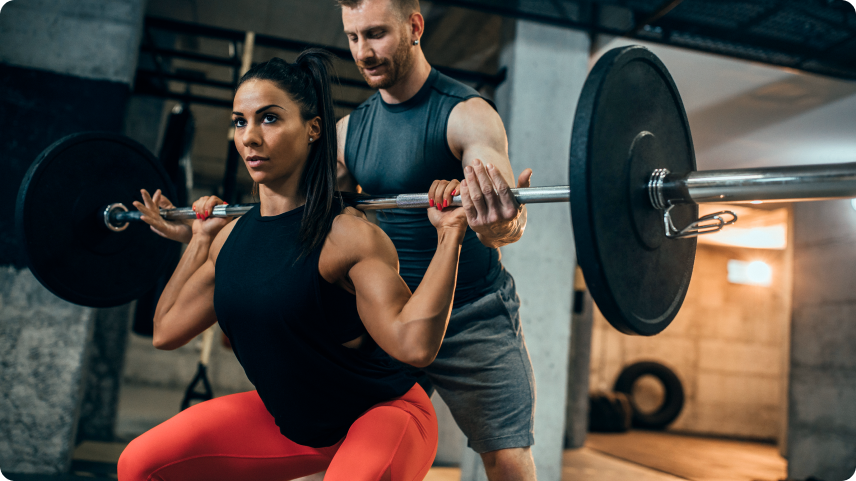
Now that we’ve cleared up our exercise routine, let’s jump into diet.
Diet for Losing Fat and Gaining Muscle
Diet is arguably one of the most critical aspects of building muscle and losing fat. What does a healthy diet to lose weight and gain muscle involve?
First of all, let's start with the basics. You consume a certain number of calories during the day. If you consume the same as you burn, then you're in a calorie balance. It's good to be in a calorie deficit when we lose weight. This means eating fewer calories than you burn. For building muscle, it's best to be in a small surplus or eat slightly more calories than you burn.
This creates the first paradox of the necessary calories to lose weight and gain muscle.
The good news is that you don’t quite need to be dieting to lose weight and gain muscle. It appears that calorie deficits of 500 calories can impair lean muscle growth. You’re better off with a small deficit of a few hundred calories or just continuing with your maintenance calories for a bit.
Alternatively, you can employ a calorie cycling approach. This means alternating days of calorie restriction with days of maintenance calories. This approach can support weight loss without affecting your body's calorie-burning capacity. Eat at maintenance on the days you work out and restrict on the days you don’t.
Protein intake is another crucial aspect of the "lose weight and gain muscle" diet. Protein is vital for weight loss as it helps keep us full. In addition, protein prevents lean muscle wastage. This macronutrient is also essential for muscle growth, as it provides building blocks for muscle tissue.
You must increase protein to lose weight and gain muscle. You can gain muscle by eating between 1.6 and 2.0 grams of protein per kilo of your weight. Make sure you get protein regularly throughout the day and plan your meals around protein sources.
Learn more about protein and its relation to muscle growth here.
The rest of your meals should contain plenty of slow-digesting carbohydrates, fiber, and adequate amounts of fat.
Remember that any meal plan to lose weight and gain muscle must include sufficient micronutrients. Therefore, you should focus on including enough veggies and fruits on a day-to-day basis.
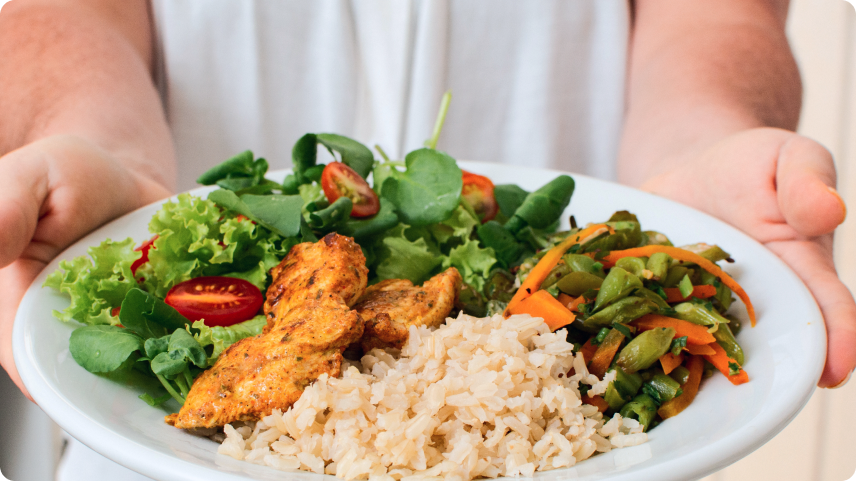
How Long Before Working Out Should You Eat?
Before we get into the details of when to eat before the gym, we need to understand why we need to eat in the first place. In order to work out well, we need to have sufficient energy to do so. That’s why before you head into the gym, you need to make sure that your body has enough energy to perform well, so it’s a good idea to have a snack. Most of this energy will come from carbohydrate.
How long before a training session do you have your meals? How long you eat before the gym session will largely depend on your body and how you feel after eating. However, there are certain guidelines that can serve most people.
If you’re planning on a substantial meal, it’s best to eat it about 3-4 hours before you work out. That will give you enough time to digest without causing any issues.
For a smaller snack, the ideal window is about an hour or two before you train. Should you want to train before having breakfast for example, it’s a good idea to have a small snack that you can easily digest a little before you train.
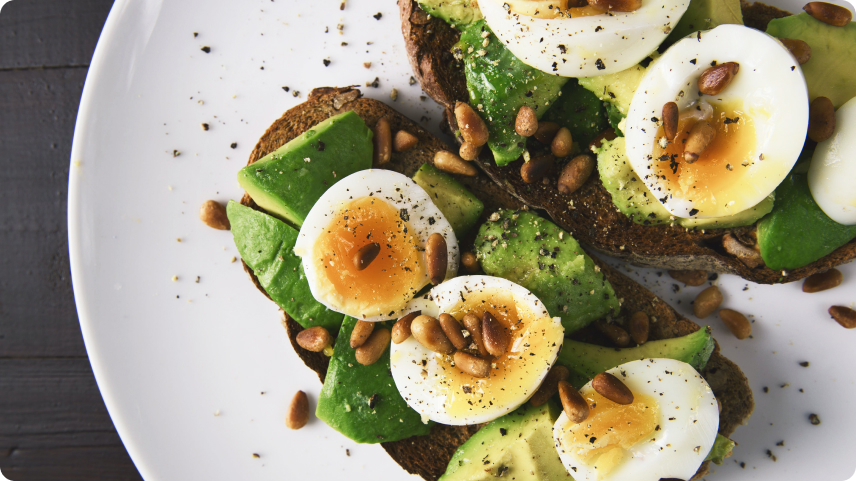
Now that you understand the timings of when to eat, the next question that comes up naturally is what should you have before you train.
What to eat before a workout
As a rule of thumb, no matter what you decide you will eat, you need to ensure that your healthy foods and snacks fall into your daily calorie goals. This will ensure that you’re meeting your nutritional goals alongside your work out goals.
Let’s talk about what you should eat if you’re planning to eat a meal before training.
A pre-training meal should consist of all the macros, including carbs, protein, and fats. This can be your standard meal at that time of the day. Choose leaner sources of protein where you can and don’t go overboard on the fats. You can load up on carbohydrate here if you want to, but if you follow a certain macronutrient split for most meals, you can use it for this one as well.
The pre-workout snack is the one that requires more attention. About two hours before a training session, your aim is to replenish your body’s energy with carbohydrate. However, there are a few things to keep in mind:
- Your snack shouldn’t be rich in fats as they’re slow to absorb
- Your snack shouldn’t be rich in fiber either
- If you’re having protein in your snack, choose lean sources and smaller protein portions
- Your focus should be on carbohydrate, especially complex carbs
So, what can that look like for you? There is a large variety of things you can eat for your pre-workout snacks, such as:
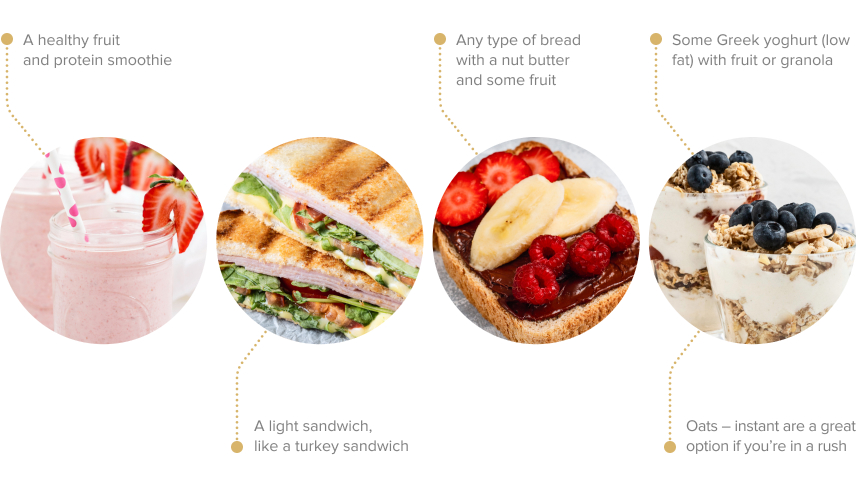
If you need a top up right before your training, aim for something that’s quick and easy to digest. Additionally, make sure that you drink a glass of water with this snack. Some great options include:
- Fresh fruit – think apple slices, bananas
- Dried fruit
- Applesauce
- Crackers or pretzels
- Juice
- Some dates
- An energy bar
- Low-fat chocolate milk
One of the most important parts of your pre-workout nutrition is actually your fluid intake. You need to be well-hydrated before you hit the gym, so start early and sip on water constantly in the few hours before you train. You can also choose to follow up your water with an electrolyte drink while you exercise.
If you’re training hard and for a prolonged period of time, don’t be afraid to top up your energy while you’re training. This can be especially useful for those who train for longer than an hour, for those who do endurance events, and for those who play sport that requires stopping and starting. If that’s your situation, get some carbohydrate in you in the middle of your workout. This can be a carbohydrate gel, some honey, or even a sports drink that contains carbs and electrolytes.
Watch the portion size
There’s a fine balance between fueling yourself and eating so much that you feel a bit bloated while you train. That balance needs to be carefully maintained.
As a rule of thumb, choose smaller portions the closer you are to your training session. A few hours before training, you can have a proper, nutritious meal. However, within an hour before you exercise, have a smaller snack, such as a bagel or an energy bar.
For carbohydrate, a good rule to follow is to eat one gram of carb per kilo of your weight if you’re eating an hour before working out. With every hour before your training, increase that amount by 1 gram, so if you’re eating two hours before a workout, you can eat 2 grams of carb per kilo of your weight.
You may also opt for a very small snack right before a workout, such as some fruit or some applesauce. It’s important to remember that this is a snack, rather than a meal, so your goal is to top up your energy and not make you feel full. A liquid drink might be quite useful here if you require the energy but don’t feel hungry enough to eat.
However, remember that every body is different, and it might require some time and experimentation to figure out what is optimal for you and what turns out to be the best time to eat for your lifestyle. Don’t be afraid to try new combinations of snacks and timings, and when you find something that works, stick to it.

Foods to avoid
If you’re having some food within an hour before you’re hitting the gym, it’s important to make sure you eat easily digestible things. Stick to liquid forms when you can, such as juices or low fat milk.
Try to limit your consumption of protein and fats straight before working out, as they’re hard to digest and you might feel uncomfortable during training. No one wants to feel bloated when they’re on the leg press or on a treadmill, so pick carb-only snacks.
When you’re eating a few hours before a workout, it’s okay to include some fats and some protein with the meal, but don’t go overboard. Typically, the longer before you train, the more of these macronutrients you can have.
For a good pre-workout meal, forgo unhealthy options, such as fast food as well. As with any meal, make sure your pre-workout meals fit into your calorie goals for your day. This is especially important for those who are trying to shed some pounds or for those who need to optimise their body composition in a certain way.
Sports supplements
Some people like to pre-empt their workout with sports supplements, which can be anything from protein powders to pre-workout mixes. It’s important to remember that in most cases, choosing a food-based snack may be more effective, as you’re likely to get the carbohydrate you need. However, certain supplements can help you work out intensively, which is why you might consider adding them to your pre-workout meal to maximize your workouts.
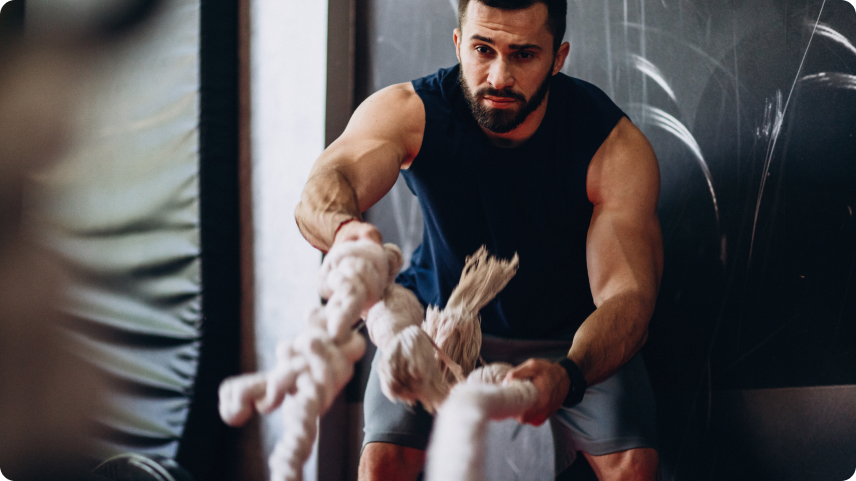
Protein and gainer
A good rule of thumb is that if you’ve got over 2 hours before your workouts, you can eat more protein and fats. A protein supplement can be useful in this instance, when you’re making a protein smoothie for breakfast or maybe just looking to get some extra protein as a snack. A gainer can also be used at this time, as it is rich in carbohydrate and also protein. You can have some protein before working out if you’re doing a resistance session.
However, for best results, save these for after your workout. That’s because straight after a grueling training session, there’s a window of a few hours where your body will benefit from the protein to re-build your muscle. If you’re able to have some carbohydrate with the protein, like in the case of the gainer, even better. That will help you rebuild glycogen, which is especially beneficial if you need to recover in a short amount of time.
Amino acids
Amino acid supplements can also be very popular before working out. There are two main types of amino acid supplements, ones that impact your muscle building, and ones that impact performance without being incorporated into the muscle.
The first class mainly consists of BCAAs and glutamine. These aminos are used to make muscle directly, which is why they’re so important. These can be a useful pre-workout addition for a few reasons.
BCAAs are great for helping with recovery and with lowering your tiredness levels, and you can take them before, during, or after a workout. They can also be beneficial for those who exercise while restricting calories, as they help preserve the muscle you have. When you exercise on an empty stomach, your body might start using your muscle mass for fuel, and BCAAs help prevent that from happening. They take around 30 minutes to peak after you’ve consumed them, so aim to take them 15-30 minutes before exercise.
Glutamine is a useful amino acid for supporting those that train intensely over long periods of time, like endurance athletes. After long bouts of training, the immune system is temporarily weaker. Glutamine is used as fuel by your immune system, and additional supplementation is great for helping you stay in top health no matter how hard you’re training. It can help with supporting your recovery.
The second class consists of other amino acids that are commonly added to pre-workout mixes. You may have heard of things like l-citrulline or beta-alanine, which can all support performance in their own way. These usually work by helping you with fighting tiredness or supporting endurance. Most of these supplements can be taken anywhere from 45 minutes to 15 minutes before you hit the gym. Your best bet is following the instructions on your supplement’s packaging.
Fat-burning complexes
Those trying to look after their weight may instead choose to use a fat burning complex before their workout. If you choose to do so, you should follow the guidance on the product that you’re using.
A particular ingredient that you might find in a fat burner is caffeine. It’s a great pre-workout supplement when you need a little energy boost. Caffeine works by helping your body use fats for fuel, which spares your glycogen and allows you to train for longer before you get tired. If you’re using a supplement containing this active ingredient, it’s best to do so about an hour before you work out, as it takes a while for caffeine to be absorbed.
L-carnitine
A popular supplement that many choose to take before working out is l-carnitine. This is a compound that the body makes naturally, and it takes part in the generation of energy in our cells. Additionally, it can reduce lactic acid accumulation, which helps fight tiredness as you work out. You can use this supplement directly before your training.
Pre-workout nutrition is an important aspect of your performance and your health. It’s therefore important to understand how to properly nourish yourself before you get in the gym for a killer session. Try ensuring you’re getting enough carbohydrate in before a training session, so that you feel energized to push yourself to a new level. Additionally, you may be interested in workout supplements that can help you support your performance. Experiment and find a strategy that works for you and gets you where you need to be.



